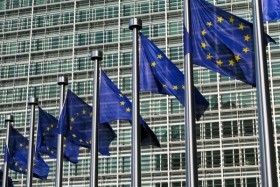The European Parliament voted for net neutrality, but left loopholes for its violation
 Today, the European Parliament has adopted a package of laws Telecoms Single Market, which cancels roaming tariffs for cellular communications in the European Union countries, and also introduces network neutrality - the principle that all data on the network should be considered equivalent from the point of view of the Internet provider.
Today, the European Parliament has adopted a package of laws Telecoms Single Market, which cancels roaming tariffs for cellular communications in the European Union countries, and also introduces network neutrality - the principle that all data on the network should be considered equivalent from the point of view of the Internet provider.Unfortunately, the adopted legislation is not ideal, and the European Parliament rejected the amendments proposed by Internet activists. Sir Tim Berners-Lee criticized the regulation in the current edition, and representatives of a number of Internet companies, including BitTorrent, EyeEm, Foursquare, Kickstarter, Netflix, Reddit, Transferwise, Vimeo and YPlan, signed an open letter with protest.
The European Parliament did not listen to the Internet public and still adopted the new rules in the current edition. They will take effect in November 2015.
')
What is wrong with the legislation?
The new rules “do not provide real net neutrality in the European Union and are much weaker than the current legislation on net neutrality in the United States,” explains Stanford University law professor Barbara van Schewick. According to her, the legislation without the proposed amendments "threatens the open Internet in Europe."
On the positive side, the rules prohibit Internet providers from blocking or slowing down the loading of websites or from taking additional payment from websites for faster transmission of their traffic to users, or impose the same fees on users for the “fast lane”.
At the same time, there are four serious problems in the rules of net neutrality.
1. Internet providers retain the right to introduce “fast lanes” for companies that pay for “specialized services”. It is understood that medical channels and other critical data will be considered specialized services, but the definition is too general and providers have the opportunity to offer the same fast lines under the guise of specialized services, according to Barbara van Shevik.
2. There is no ban on the transfer of traffic at a zero rate (zero-rated). That is, Internet providers retain the ability to choose sites and services, traffic to which will not be charged. Thus, network neutrality is in fact violated, because these sites and services gain an unfair advantage over the others. Naturally, providers do it not for free, but by receiving money from these sites and services. That is, rich and large Internet companies gain a competitive advantage over start-up start-ups. Moreover, now in the Netherlands and Slovenia there are legislative prohibitions on the transfer of traffic at zero rate - the decision of the European Parliament makes these laws invalid.
3. The rules allow providers to define “types of traffic” and speed up or slow down traffic of a certain type, even if there is no congestion. For example, providers can slow down P2P traffic or encrypted traffic. Previously, there were cases when Internet providers assigned low priority to all encrypted traffic, that is, they slowed down its transmission. This will continue further, which weakens the overall security of the Internet.
4. Internet providers have the right to begin to deal with congestion of communication channels even in the absence of such congestion, but only when it is threatened. According to lawyers, providers can use this paragraph of the rules as an excuse for discriminatory traffic management.
As already mentioned, the deputies rejected the amendments to the law that eliminate the loopholes in the regulation. So it’s too early to rejoice at the introduction of “net neutrality” in Europe. This is just a formality or, as critics say, a mockery .
Naturally, the Pirate Party has already come out with a criticism of the accepted norms about the fake “net neutrality”.
Source: https://habr.com/ru/post/356894/
All Articles